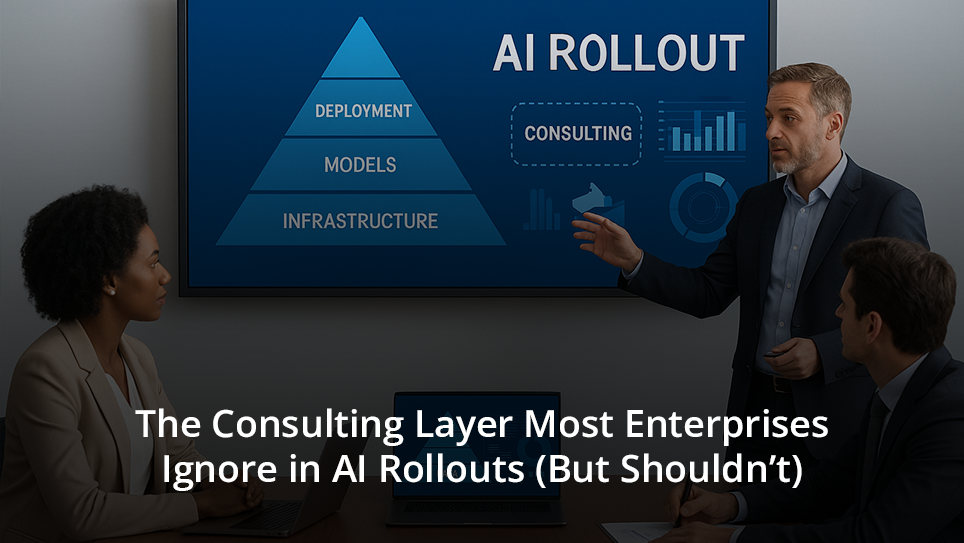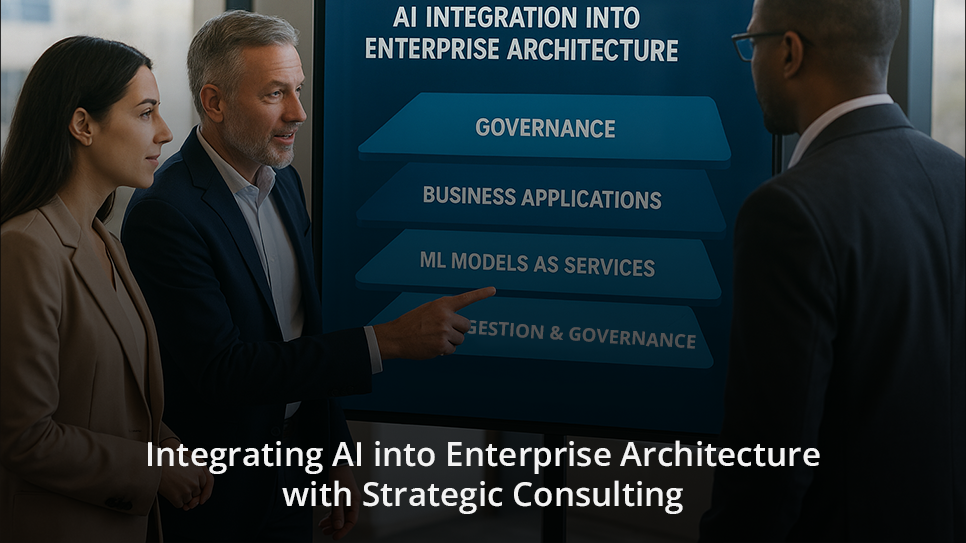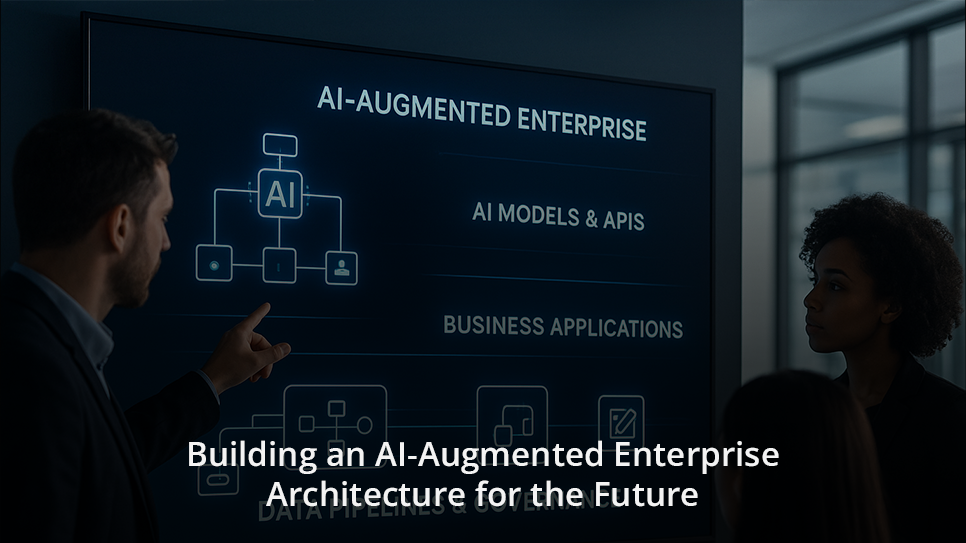The Consulting Layer Most Enterprises Ignore in AI Rollouts (But Shouldn’t)

Introduction
Enterprises are racing to adopt AI, yet most struggle to scale beyond pilots. The issue isn’t technology or talent; it’s the missing AI strategy consulting layer that aligns vision with execution.
While nearly every company is investing in AI, only about 1% are truly “AI mature,” with AI fully embedded in workflows and driving outcomes. Without a structured strategy, governance, and enterprise-wide alignment, projects stall in silos.
The consulting layer, spanning strategy, architecture, governance, and implementation, is what turns AI from scattered experiments into a real transformation.
The Overlooked AI Strategy Consulting Layer in AI Rollouts
Rolling out AI isn’t just a technical task; it’s a strategic transformation. This is where AI strategy consulting comes in, aligning initiatives with business goals and enterprise architecture. Rather than focusing only on algorithms or cloud platforms, consultants bridge C-suite vision with technical execution to ensure projects deliver real ROI.
Without this layer, AI efforts often fragment across business units, leading to silos, poor integration, and wasted investment. As BCG notes, haphazard implementations risk making AI “useless” due to data and coordination issues. AI strategy consulting prevents this by creating a unified roadmap, clear value targets, and a robust enterprise AI architecture to support solutions across the organization.
Integrating AI into Enterprise Architecture with Strategic Consulting

A successful AI rollout requires rethinking the enterprise AI architecture, the blueprint of how AI fits into business processes and IT systems. AI strategy consulting ensures AI isn’t a bolt-on experiment but an integrated, scalable component of the enterprise stack.
In practice, this means treating AI models and APIs as core services mapped to business capabilities. A layered design works best: data ingestion and governance at the base, ML models as services, business applications on top, and a governance layer to oversee outputs.
Before scaling, consultants help “sort out the basics” by asking: Where can AI add value? Do we have the right data and infrastructure? How will models be updated and governed? Addressing these questions upfront prevents wasted investment in trendy use cases and ensures AI efforts are tied to business goals. The result is a clear AI roadmap and a strong foundation for enterprise-wide scaling.
Why an AI Governance Layer Is Critical (and Often Ignored)
Governance is one of the most overlooked aspects of AI rollouts. An AI governance layer provides the frameworks and guardrails to ensure AI is used responsibly, ethically, and in compliance with regulations. It must be built into the rollout, not added later.
Without governance, issues like bias, privacy breaches, or inconsistent performance can quickly escalate. As one expert noted, you must “govern AI before the logic forms.” This means setting clear approval authority, defining acceptable model behavior, and implementing monitoring systems from the start.
AI strategy consulting teams help enterprises design this layer. They create AI policies, run bias audits, ensure regulatory compliance, and set up oversight boards. With governance woven into implementation, companies reduce legal risks, build trust, and ensure their AI remains safe, compliant, and effective.
From Plan to Execution: The Value of AI Implementation Consulting
Even with a solid strategy, many enterprises struggle to execute AI projects. This is where AI implementation consulting becomes essential. Consultants don’t just deliver a strategy, they guide development, testing, and integration, ensuring projects move beyond “pilot purgatory” to full-scale deployment.
A major value is bridging the knowledge gap. Many firms lack in-house experts in model deployment, MLOps, or system integration. Consultants bring proven frameworks, reference architectures, and best practices that speed up rollout, cut trial-and-error, and reduce time to value. They also know how to integrate AI with legacy systems, optimize cloud resources, and establish CI/CD pipelines for ML models.
Consultants also keep execution aligned with business objectives. They define KPIs tied to decision speed, cost savings, or revenue growth, preventing teams from chasing technical metrics without impact.
Finally, they support change management: training employees, updating processes, and communicating benefits to build trust and adoption. This people-first approach smooths AI’s integration into daily workflows.
In short, AI implementation consulting turns strategy into reality. It ensures solutions are scalable, business-aligned, and embraced by the organization, helping enterprises realize value faster while avoiding costly missteps.
Building an AI-Augmented Enterprise Architecture for the Future

For long-term success, enterprises must evolve toward an AI-augmented enterprise architecture. AI should be part of the operating model and tech stack, not just a side project. With AI strategy consulting, organizations can embed AI into enterprise design in a structured way.
In practice, this means treating AI services, models, APIs, and data pipelines as core building blocks mapped to business capabilities. Every AI initiative is tied to clear outcomes, avoiding fragmented experimentation.
Governance is built in from the start with access controls, bias checks, audit logs, and monitoring. The architecture remains adaptive, so new models, regulations, or business needs can be incorporated without rebuilding systems.
More enterprises now see AI as a “core force in digital strategy.” Consultants introduce frameworks such as capability maps to pinpoint high-impact areas and guide phased rollouts. The goal: an enterprise architecture where AI is scalable, governed, and fully aligned with business strategy.
Choosing the Right Partner and Internal Alignment
Implementing the consulting layer might involve partnering with external experts. Engaging a specialized generative AI consulting firm or AI strategy consulting company can provide enterprises with cutting-edge expertise and an outside perspective. The right consulting partner will evaluate your business holistically and work to augment your team’s capabilities – not replace them. When selecting a partner, consider their track record in AI strategy consulting, their understanding of your industry, and their development expertise.
For example, if you need to build custom integrations or AI-driven applications within your existing systems, a firm that offers custom Java development services alongside AI expertise can be invaluable. Likewise, if speed and cost-efficiency are priorities, look for consultants who can leverage nearshore app development teams to rapidly build and deploy solutions in closer time zones. Industry-specific knowledge is a bonus; a consulting team experienced in trading platform software development, for instance, will understand the compliance and real-time data needs of a financial enterprise’s AI projects. In short, the ideal consulting partner has a blend of strategic AI know-how, technical development skills, and domain experience, enabling them to reinforce that missing layer in your AI rollout.
Finally, don’t overlook internal alignment. The consulting layer is most effective when your leadership and teams actively collaborate with it. This means executives champion the AI strategy, mid-level managers coordinate with consultants to implement changes, and employees are empowered (and trained) to work with the new AI tools. With leadership driving and a strong consulting layer guiding, enterprises can transform AI from an experimental tech initiative into a scalable, governed, and strategic business asset.
Frequently Asked Questions (FAQs)
1. What is AI strategy consulting?
AI strategy consulting is a service where experienced AI advisors help organizations plan and execute their AI initiatives in alignment with business goals. It involves assessing the company’s readiness for AI, identifying high-value use cases, crafting an AI roadmap, and defining the enterprise AI architecture and governance needed for success. In essence, AI strategy consulting provides the strategic layer to ensure AI investments translate into real business impact, rather than isolated tech experiments.
2. Why do enterprises need an AI governance layer?
An AI governance layer is essential to ensure that AI systems operate safely, ethically, and in compliance with regulations. This layer includes policies, processes, and oversight mechanisms that govern how AI models are developed, deployed, and monitored. Without governance, AI projects can run into issues like biased outcomes, security vulnerabilities, or regulatory violations. A governance layer, often established with the help of AI strategy consulting experts, sets rules and implements controls so that AI outcomes remain trustworthy and aligned with the organization’s values and laws.
3. How does AI strategy consulting integrate with enterprise AI architecture?
AI strategy consulting works hand-in-hand with enterprise AI architecture by ensuring that AI solutions fit seamlessly into a company’s technology landscape and processes. Consultants assist in designing an architecture where AI components (models, data pipelines, APIs) are properly integrated with existing systems. They help create an AI-augmented enterprise architecture, meaning the enterprise architecture is enhanced to incorporate AI capabilities across various layers – from data management to applications.
4. What is AI implementation consulting?
AI implementation consulting focuses on the execution phase of AI projects. After the strategy is defined, implementation consultants help build, test, and deploy AI solutions effectively. This includes project management, technical development, integration with IT systems, and user adoption support. AI implementation consulting ensures that the AI models and tools envisioned in the strategy are delivered correctly.
5. What does “AI-augmented enterprise architecture” mean for a business?
An AI-augmented enterprise architecture refers to an enterprise’s technology and process architecture that has been enhanced and optimized with AI capabilities. In practical terms, it means AI is embedded into the core of business operations and IT systems, rather than being an add-on. For a business, this could manifest as AI-driven decision support integrated into workflow applications, AI services that enhance customer experience on digital platforms, or AI tools assisting in internal processes like supply chain optimization. An AI-augmented architecture is designed with adaptability, allowing new AI innovations to be incorporated over time.
6. How should we choose the right AI strategy consulting partner?
Choosing the right AI strategy consulting partner involves evaluating a few key factors. First, look at their expertise and experience – have they successfully guided other enterprises in your industry through AI rollouts? Strong partners will have case studies or references showing tangible results. Second, consider their range of capabilities: the best consultants can cover strategy through implementation. For instance, if your project involves developing custom software or integrating with legacy systems, a consulting firm that also offers engineering support will add extra value.
